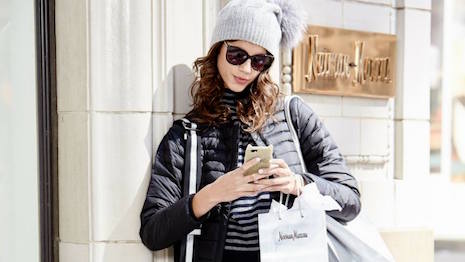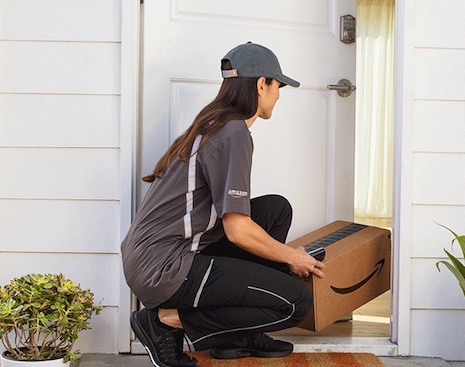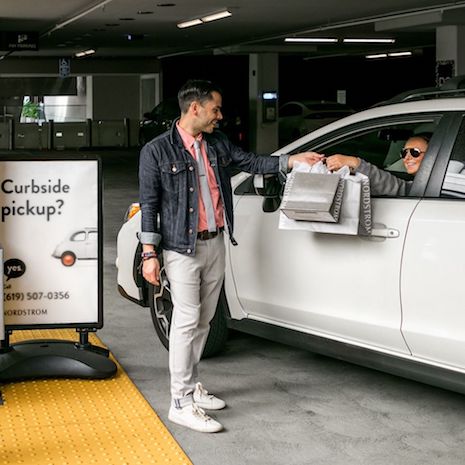 Mobile technology can help encourage loyalty and dwell time. Image credit: Neiman Marcus
Mobile technology can help encourage loyalty and dwell time. Image credit: Neiman Marcus
As retailers seek to meet consumer demand for personalization through technology, they need to blend the desire for innovation with mindfulness about data privacy.
A new report from SOTI finds that while about three-quarters of consumers want to have a personalized in-store shopping experience, one-third say they do not want to sacrifice their personal data security to enable this level of customization. From beacons and drones to voice assistants, American shoppers are more apt than consumers in the United Kingdom, Sweden and Germany to have a positive feeling towards technology within the purchase path.
"Our State of Mobility in Retail report found that while consumers enjoy the many conveniences of technology while shopping, they are unwilling to sacrifice personal data security to improve their in-store experience," Shash Anand, vice president of product strategy at SOTI. "Data privacy and transparency remain a top concern among consumers.
"Businesses must be cognizant of new regulations around General Data Protection Regulation (GDPR) and the California Consumer Privacy Act (CCPA), which came into effect last week, and how this impacts the handling of consumer data," he said. "Retailers could face heavier restrictions on the use of technology to engage with customers, conduct business and stay competitive. Therefore, they must be compliant, and ensure consumer data is protected and confidential personal data is encrypted and anonymized."
Bricks meets clicks
Twenty-four percent of consumers say they would prefer a bricks-and-mortar experience that is devoid of technology, pointing to the growing demand for innovation in retail.
Retailers that get mobile in-store technology right can benefit.
About three in 10 customers say they would be more loyal to a store that has a positive technology experience. Additionally, 22 percent say they would spend more time in the store, while 19 percent expect that they would spend more.
Across the board, about two-thirds of consumers associate mobile technology with a speedier bricks-and-mortar shopping experience.
Seventy-eight percent of U.S. respondents said that mobile tech in the hands of both sales associates and shoppers helps to speed the process, whether helping a customer find merchandise or enabling self or remote checkout.
Showing an openness to alternative points of sale, 45 percent of Americans said they prefer mobile POS over traditional cash registers.
"Contrary to popular belief, in-store technology provides more opportunities for sales associates to nurture customer relationships, which can in turn also improve employee morale," Mr. Anand said. "Digitizing the in-store experience allows retail employees to shift their focus to provide more personalized customer service that set them apart, which doubly helps retailers differentiate themselves from the competition.
"Equipping sales associates with mobile devices provides customers the flexibility to pay for their purchases on the sales floor, for example, allowing them to get in and out of the store quickly without having to wait in a lengthy checkout line," he said. "Or they can help customers find exactly what they need quicker, even if it’s not on the sales floor."
Beyond the checkout process, 48 percent of U.S. consumers say they are “excited” about the potential for beacons and facial recognition to personalize their shopping experience. Comparatively, less than 40 percent of consumers elsewhere showed enthusiasm.
Aside from in-store technology, innovation is also extending to ecommerce fulfillment.
When it comes to alternative delivery methods, U.S. consumers stand out as being more open than the other respondents.
Consumers in the U.S. and Sweden were slightly more open to in-home delivery than the other respondents. Across the board, less than one in five said they were comfortable with allowing a delivery person to enter their home through services such as Amazon Key.
Amazon Key delivery. Image credit: Amazon
While Americans were most interested in drone delivery, with 37.5 percent viewing it favorably, Germany came in at a close second.
U.S. consumers are slightly more accepting of autonomous vehicle deliveries. However, the U.S. is far more open when it comes to in-car package delivery, with about 28 percent interested in this method compared to 15 percent or less in other nations.
Click-and-collect is most popular in the United Kingdom, with about half of British respondents noting comfort with buy online pickup in store fulfillment. This type of service became widespread in the U.K. earlier than the U.S., potentially contributing to the broader acceptance among the U.K. audience.
Nordstrom has curbside pickup service. Image credit: Nordstrom University Towne Centre in San Diego
"Both technologically advanced nations, and early adopters of new technology, the U.S. and Sweden demonstrated similar levels of optimism and excitement about new and emerging technologies that are changing the face of retail today," Mr. Anand said. "More than the other countries surveyed, U.S. consumes desire a personalized shopping experience that intuitively understands them and their preferences.
"Retailers are now looking to create more customizable shopping experiences and are leveraging technology to tailor such an experience," he said. "According to the report, nearly half of Americans are open to retail innovations like facial recognition and beacon technology. Half of U.S. shoppers are 'very comfortable' shopping via familiar voice-activated assistants like Amazon Alexa and Google Home, demonstrating that U.S. consumers are quite open to using a variety of shopping-related technologies. Lastly, U.S. consumers are always 'on-the-go,' therefore technological innovations when it comes to delivery are of interest to them; 37.5 percent of U.S. shoppers are open to delivery via drones and autonomous vehicles.
"It is important to note, however, that genuine levels of trust for new technologies can only occur once a solution has been widely available and tested for a period of time. These levels of comfort can only settle in among consumers if retailers capitalize on the evident enthusiasm to adopt emerging technologies and encourage faster rates of uptake by integrating them into the retail experience."
Personalization potential
Shoppers and retailers are not on the same page when it comes to the future of fashion technology, with many brands investing in high-tech features that have little to no traction among today's customers.
According to a recent report from Klarna, 73 percent of consumers explicitly value in-store shopping trips. However, 42 percent of retailers are prioritizing online shopping technology, indicating a disconnect between strategy and consumer preferences as bricks-and-mortar experiences are neglected (see story).
As both luxury and mass-market shoppers seek greater omnichannel experiences that enhance their customer journey, retailers that are not using location data are falling exceptionally behind.
A new report from Blis revealed that 70 percent of retailers are leveraging a mobile-first strategy to customer data, leveraging location to better serve their shoppers. Sixty-one percent claim that they have transformed their bricks-and-mortar strategy to be more personalized (see story).
"Some of today’s most successful retailers have already implemented ways to combine the online and offline experience with technologies like facial recognition, augmented reality and AI, to stand out from the crowd,"Mr. Anand said. "Retailers will begin to make stronger and more meaningful connections with consumers through interaction with products, digital displays and other in-store technologies.
"Leveraging AI, IoT and data analytics can help retailers boost customer engagement and employee productivity, while delivering against consumer expectations and edging out the competition," he said. "By extracting meaningful insights from collected data, retailers will be able to deliver better, more customized offers to customers in the relevant channel at the right time, which will help drive loyalty."

